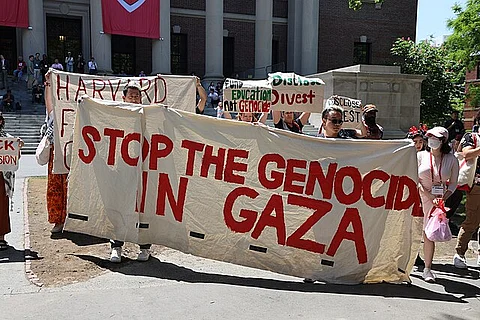

A controversial policy document named Project Esther, crafted by the Heritage Foundation, a leading conservative think tank, has emerged as a blueprint for targeting the pro-Palestine movement in the United States.
Critics argue it seeks to dismantle activism by branding supporters as part of a fictitious “Hamas Support Network” (HSN), a claim advocates dismiss as baseless and inflammatory.
Released last year, Project Esther outlines a multi-pronged strategy to curb advocacy for Palestinian rights, focusing on legal, financial, and political measures.
The document, spearheaded by Victoria Coates, a former Trump administration official and Heritage Foundation vice president, calls for actions like revoking visas of foreign students critical of Israel, denying permits for pro-Palestine protests, and purging academic programs deemed sympathetic to Palestinians.
“The phase we’re in now is starting to execute some of the lines of effort in terms of legislative, legal and financial penalties for what we consider to be material support for terrorism,” Coates told The New York Times.
Project Esther labels groups like American Muslims for Palestine (AMP) and Jewish Voice for Peace (JVP) as part of an HSN, accusing them of advancing Hamas’s agenda.
Critics reject this, noting no such network exists under U.S. law, which strictly prohibits material support for designated terrorist groups.
“It exposes the length of lies and of absurdity that they are going through to try to tear down the Palestinian rights movement,” said Beth Miller, JVP’s political director.
Osama Abuirshaid of AMP added, “American Muslims for Palestine is an easy target. Given the Islamophobic tendencies, it’s easy to assume guilt of American Muslims, Palestinians.”
The initiative zeroes in on universities, where support for Palestine is strong among young Americans.
Tariq Kenney-Shawa of Al-Shabaka explained to Al Jazeera, “That’s why there’s such an overwhelming focus on universities and college campuses.”
Project Esther advocates defunding institutions, removing faculty, and reforming Middle East studies programs it views as anti-Israel.
Recent moves by the Trump administration, such as pressuring Columbia University to review its Middle East department, align with these goals.
Since Trump’s inauguration, actions mirroring Project Esther’s recommendations have intensified, including visa revocations for pro-Palestine students and threats to withhold university funding.
The document also cites Canary Mission, a site known for doxxing activists, as a resource.
However, advocates remain defiant.
“The extreme nature of these attacks has also emboldened people to defiantly continue to speak out,” Miller said.
Abuirshaid echoed, “I’m going to be clear: It’s energising us to continue this fight.”
Critics like Jonathan Jacoby of the Nexus Project argue Project Esther exploits antisemitism concerns to suppress free speech and progressive movements.
“Project Esther changed the paradigm by associating anyone who opposes Israeli policies with the ‘Hamas Support Network,’” Jacoby said.
As the plan unfolds, advocates warn it threatens not only Palestinian rights but democratic freedoms in the U.S.